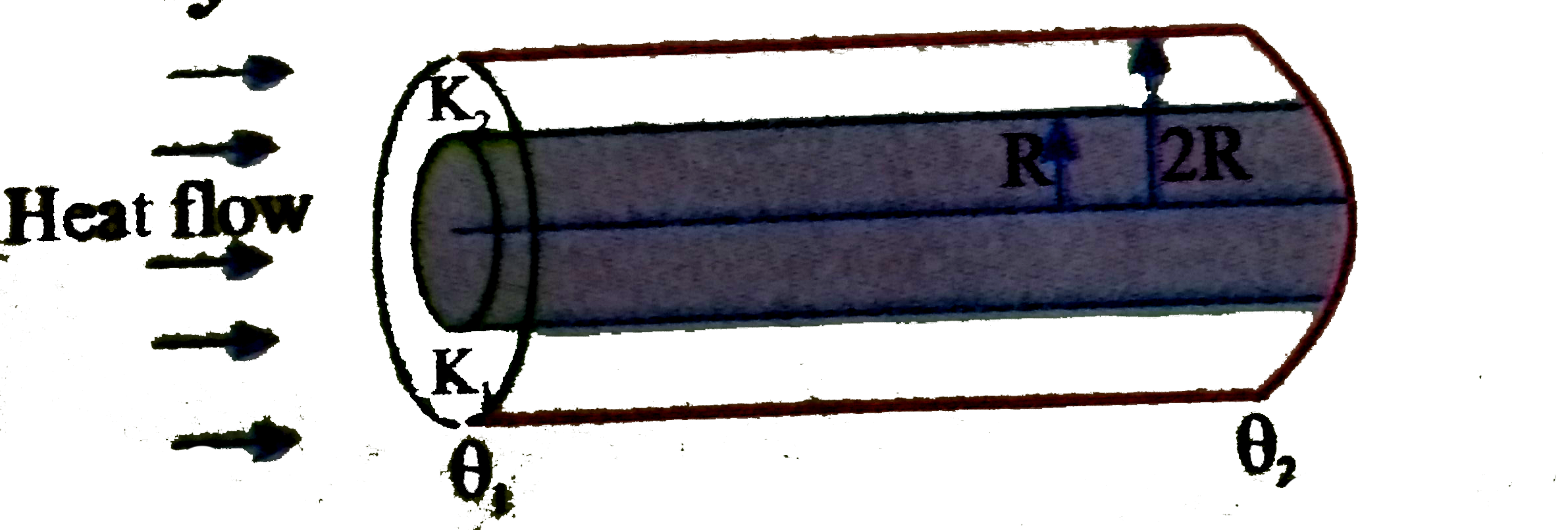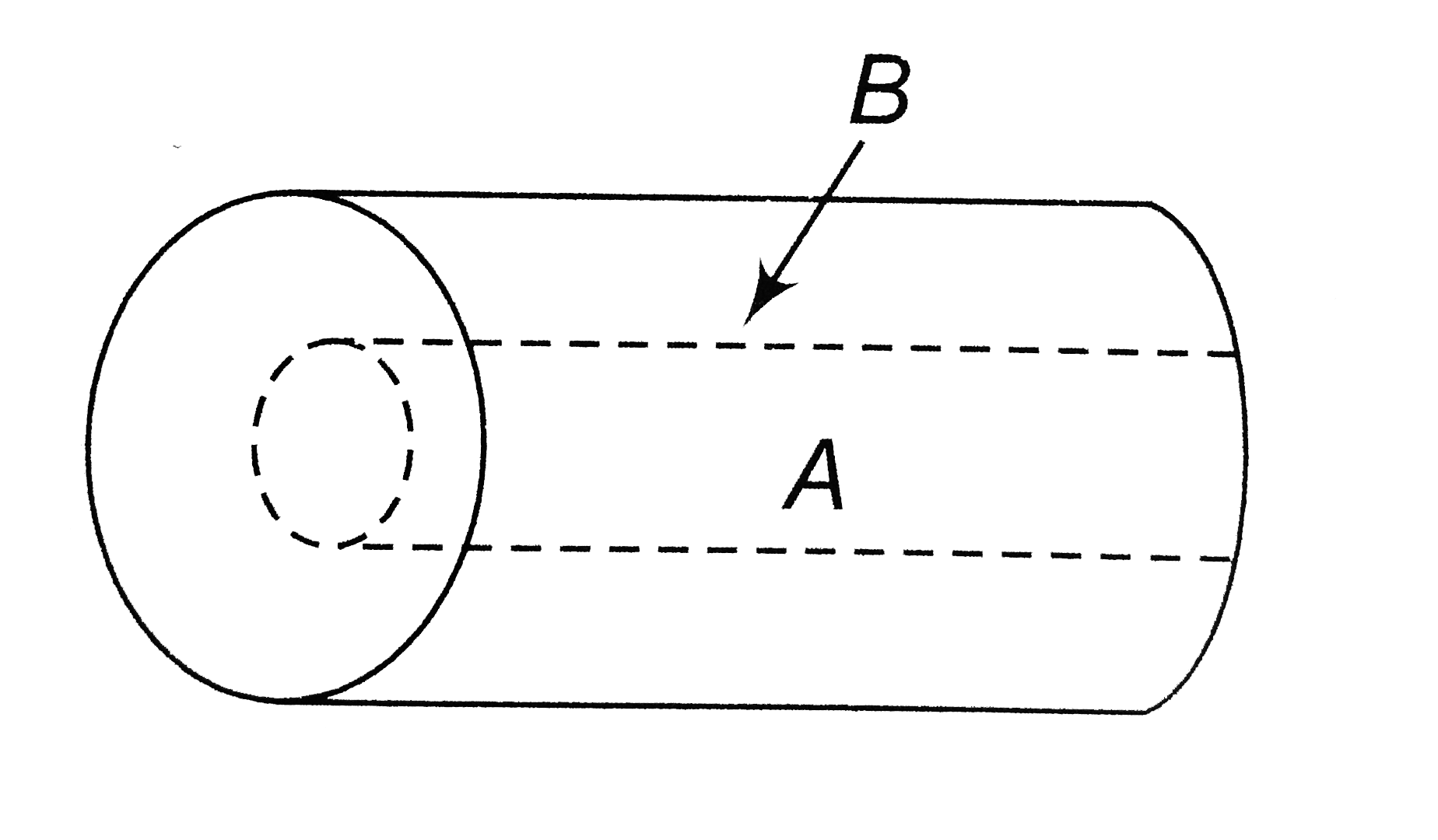A metallic cylinder of radius R and thermal conductivity K1 is surrounded concentrically by a metallic shell of inner radius R and outer radius 2R and has thermal conductivity K2 . It is given that K1:K2=2:1,K2=K and ends of the composite system are maintained at constant temperature T1 and T2(T1>T2) . If the equivalent thermal conductivity of the system is K'=αKβ , then compute α−β

The correct Answer is:1
Let the length of cylinder be L. The given system is equivalent to a rod of length L, cross section area πR2 of conductivity K1 and another rod of length L, cross sectional area π[(2R)2−R2] and conductivity K2 placed parallel to each other. In steady state, rate of heat flow through the composite system is
Qt=Q1t+Q2t
=K1A1(T1−T2)L+K2A2(T1−T2)L
=K1(πR2)(T1−T2)L+K2(3πR2)(T1−T2)L ...(i)
Also, for the composite system, cross sectional area is π(2R)2=4πR2
If K. is the equivalent conductivity, then
Qt=K.(4πR2)(T1−T2)L ...(ii)
Using (i) and (ii), we get
4K.=K1+3K2
Also , K2=KandK1=2K1=2K
∴4K.=2K+3K
⇒K.=5K4
Comparing it with K. = =αKβ
α=5andβ=4
∴α−β=1
Topper's Solved these Questions
- THERMAL PROPERTIES OF MATTERBOOK - MODERN PUBLICATIONCHAPTER - THERMAL PROPERTIES OF MATTEREXERCISE - COMPETITION FILE (EXEMPLAR PROBLEM OBJECTIVE TYPE QUESTION (MULTIPLE CHOICE QUESTION TYPE - I )
8 Videos
- THERMAL PROPERTIES OF MATTERBOOK - MODERN PUBLICATIONCHAPTER - THERMAL PROPERTIES OF MATTEREXERCISE - COMPETITION FILE (EXEMPLAR PROBLEM OBJECTIVE TYPE QUESTION (MULTIPLE CHOICE QUESTION TYPE - II )
4 Videos
- THERMAL PROPERTIES OF MATTERBOOK - MODERN PUBLICATIONCHAPTER - THERMAL PROPERTIES OF MATTEREXERCISE - COMPETITION FILE (MATRIX MATCH TYPE QUESTION )
2 Videos
- SYSTEMS OF PARTICLES AND ROTATIONAL MOTIONBOOK - MODERN PUBLICATIONCHAPTER - SYSTEMS OF PARTICLES AND ROTATIONAL MOTIONEXERCISE - Chapter Practice Test (for Board Examination)
16 Videos
- UNITS AND MEASUREMENTBOOK - MODERN PUBLICATIONCHAPTER - UNITS AND MEASUREMENTEXERCISE - CHAPTER PRACTICE TEST
15 Videos
Similar Questions
A cylinder of radius R made of a material of thermal conductivity K1 is surrounded by a cylindrical shell of inner radius R and outer radius 2R made of a material of thermal conductivity K2. The two ends of the combined system are maintained at two different temperatures. There is no loss of heat across the cylindrical surface and the system is in steady state. The effective thermal conductivity of the system is
View SolutionA cylinder of radius R, made up of a material (thermal conductivity k1) is surrounded by a cylindrical sheet of inner radius R and outer radius 2R (thermal conductivity k2). The two ends of the combined system are maintained at two different temperatures. There is no loss of heat across the cylindrical surface and the system is in steady state. Calculate the effective thermal conductivity of the system.
View Solution
Knowledge Check
A cylinder of radius R made of material of thermal conductivity K1 is surrounded by a cylindrical shell of inner radius R and outer radius 3R made of a material of thermal conductivity K2. The two ends of the combined system are maintained at two different temperatures. What is the effective thermal conductivity of the system ?
AK1+K2BK1+8K29CK1K2K1+K2D8K1+K29A cylinder of radius R made of a material of thermal conductivity K1 is surrounded by a cylinderical shell of inner radius R and outer radius 2R made of a material of thermal conductivity K2. The two ends of the combined system are maintained at two different temperatures. There is no loss of heat across the cylindrical surface and the system is in steady state. The effictive thermal conductivity of the system is
AK1+K2BK1K2/(K1+K2)C(K1+3K2)/4D(3K1+3K2)/4A cylinder of radius R made of a material of thermal conductivity K1 is surrounded by a cylindrical shell of inner radius R and outer radius 2R made of a material of thermal conductivity K2. The two ends of the combined system are maintained at two different temperatures. There is no loss of heat across the cylindrical surface and the system is in steady state. The effective thermal conductivity of the system is
AK1+K2BK1K2K1+K2CK1+3K24D3K1+K24
A cylinder of radius R made of a material of thermal conductivity K1 is surrounded by cylindrical shell of inner radius R and outer radius 2R made of a material of thermal con-ductivity K2 The two ends of the combined system are maintained at two differnet tem-peratures There is no loss of heat across the cylindrical surface and system is in steady state What is the effective thermal conductivity of the system
 .
.
View SolutionA cylinder of radius R made of a material of thermal conductivity K1 is surrounded by cylindrical shell of inner radius R and outer radius 2R made of a material of thermal con-ductivity K2 The two ends of the combined system are maintained at two differnet tem-peratures There is no loss of heat across the cylindrical surface and system is in steady state What is the effective thermal conductivity of the system
 .
.
View SolutionA cylinder of radius R made of a material of thermal conductivity K1 is surrounded by a cylindrical shell of inner radius R and outer radius 2R made of a material of thermal conductivity K2. The two ends of the combined system are maintained at two different temperatures. There is no loss of heat across the cylindrical surface and the system is in steady state. The effective thermal conductivity of the system is
(a) K1+K2 (b) K1K2/(K1+K2)
(c )(K1+3K2)/4
(d) (3K1+K2)/4.
View SolutionA cylinder of radius r made of a material of thermal conductivity K1 is surrounded by a cylindrical shell of inner radius r and outer radius 2r made of a material of thermal conductivity K2. The two ends of the combined system are maintained at two different temperatures. There is no loss of heat across the cylindrical surface and the system is in steady state. Show that the effective thermal conductivity of the system is (K1+3K2)/4.
View SolutionA cylinder A of a material of thermal conductivity K1 is surrounded by a cylindrical shell of inner radius equal to the cylinder. The shell is made of a material of thermal conductivity K2. The two ends of the combined system are maintained at two different temperature. if the effective thermal conductivity of the system is 4K1+5K29, find the rate of outer radius of the shell to the radius of the cylinder.

View Solution
